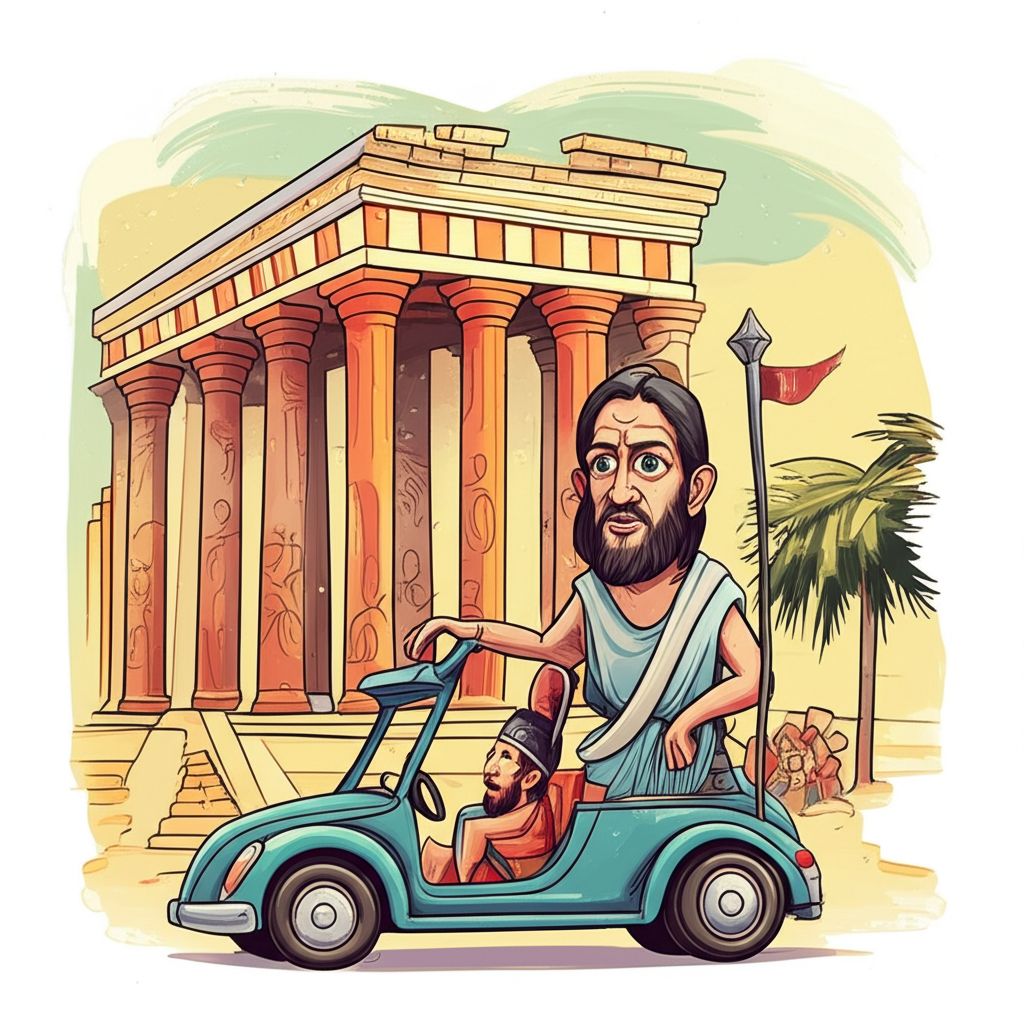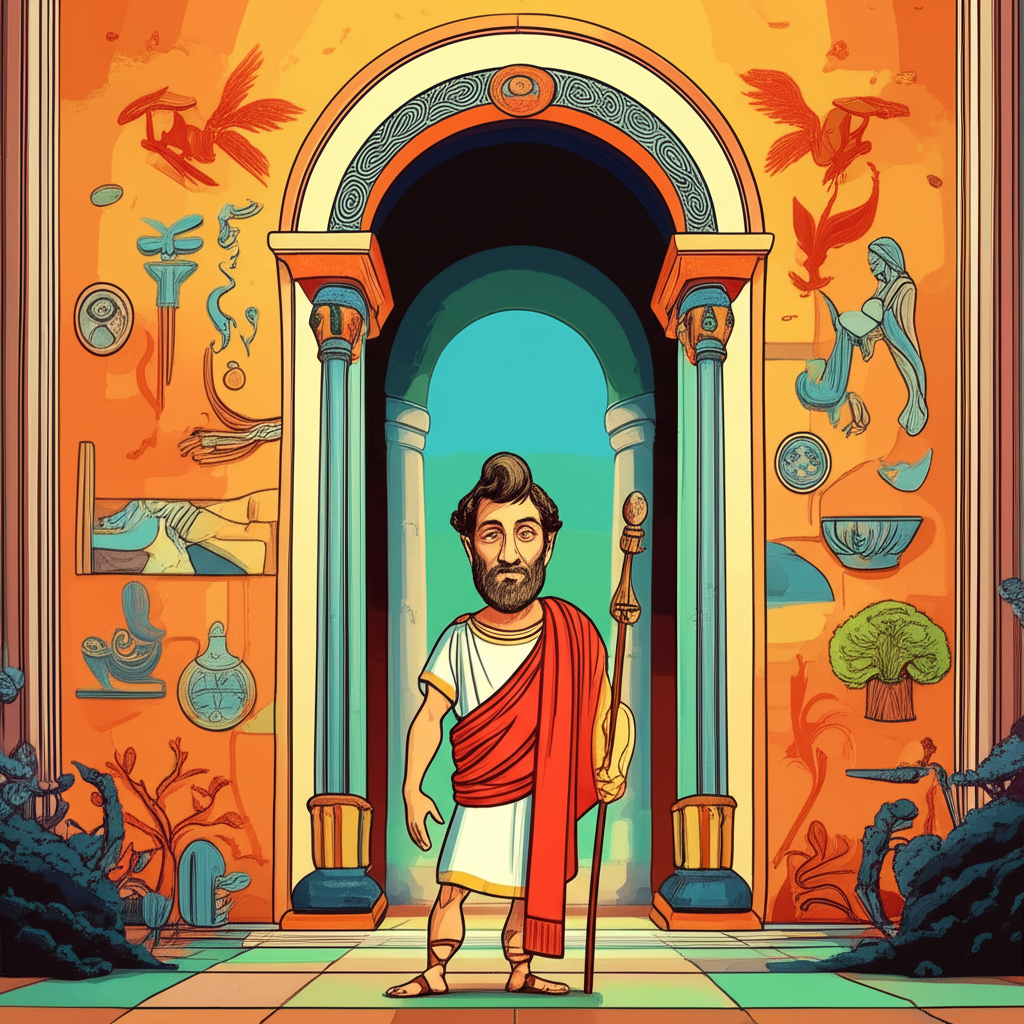Introduction:
The legend of Heracles, the mighty hero, is a cornerstone of ancient Greek mythology. Passed down through generations, this is a story from the culture of ancient Greece, a civilization that flourished in the Mediterranean region. It is a traditional narrative, a tale spun by the people of that time to explain the world around them, their fears, their hopes, and their understanding of the human condition. It is not a factual account of real events but a powerful story, rich in symbolism and offering insights into the values and beliefs of a bygone era. We approach it not as a matter of faith, but as a window into the human imagination and a glimpse into the past.
Origins and Cultural Background:
The stories of Heracles were born in the heart of ancient Greece, a civilization that reached its peak between the 8th and 6th centuries BCE. This was a time of city-states, each with its own government, culture, and deities. The Greeks viewed the world through a lens colored by polytheism; they believed in a pantheon of gods and goddesses who resided on Mount Olympus, intervening in human affairs and controlling the forces of nature. Their world was populated by heroes, demigods, and mythical creatures, all playing their roles in a cosmic drama. The Greeks were deeply curious about the world around them, attempting to explain natural phenomena through these narratives. These myths were not just stories; they were a means of understanding morality, heroism, and the relationship between humans and the divine. Life was seen as a constant struggle, a battle against fate and the whims of the gods. The concept of arete, or excellence, was central – striving for physical prowess, courage, and wisdom. This ideal, along with the gods, was what Greeks looked up to.
Character / Creature Description:
Heracles, known to the Romans as Hercules, was a demigod, the son of Zeus, the king of the gods, and Alcmene, a mortal woman. This divine lineage imbued him with extraordinary strength and endurance, making him a formidable warrior. However, his life was also marked by suffering, as his existence was constantly plagued by the wrath of Hera, Zeus’s jealous wife. Heracles’s defining characteristic was his immense strength, often depicted in art with a muscular physique and a lion skin draped over his shoulders, a trophy from his first labor. He was also known for his impulsiveness and often had a temper. Heracles wasn’t just a brute force; he also possessed courage, perseverance, and, ultimately, a desire to redeem himself. These traits, coupled with his divine parentage, made him an enduring symbol of heroic potential and the struggle against adversity.
Main Story / Narrative Retelling:
The prophecy of Delphi played a pivotal role in shaping Heracles’s life and the trials he endured. In this narrative, Heracles, driven mad by Hera, murdered his wife, Megara, and their children. Consumed by grief and guilt, he sought guidance from the Oracle of Delphi, a sanctuary considered the center of the world, where the god Apollo was believed to communicate with humans through a priestess known as the Pythia.
The Pythia, after entering a trance-like state, delivered Apollo’s pronouncements. The oracle, speaking in riddles and ambiguous pronouncements, revealed that Heracles must atone for his crime by serving Eurystheus, the cowardly king of Mycenae, for twelve years. Eurystheus, envious of Heracles’s fame and strength, imposed upon him a series of seemingly impossible tasks, the infamous Twelve Labors.
The first labor was to slay the Nemean Lion, a beast whose hide was impervious to weapons. Heracles, after a grueling struggle, strangled the lion and then used its own claws to skin it, thus creating the iconic lion-skin cloak. The second labor demanded the killing of the Hydra, a multi-headed serpent whose heads, when severed, would regenerate. With the help of his nephew Iolaus, who cauterized the wounds with fire, Heracles conquered the Hydra.
The labors continued: capturing the Ceryneian Hind, a sacred deer; capturing the Erymanthian Boar; cleaning the Augean stables in a single day; killing the Stymphalian birds; capturing the Cretan Bull; stealing the Mares of Diomedes; obtaining the belt of Hippolyta, queen of the Amazons; stealing the cattle of Geryon; obtaining the Golden Apples of the Hesperides; and finally, capturing Cerberus, the three-headed hound that guarded the entrance to the Underworld.
Each labor presented unique challenges, demanding not only strength but also cunning, strategy, and resilience. Through each trial, Heracles demonstrated his evolving heroism, transforming from a figure driven by rage and guilt into a symbol of endurance and redemption. The prophecies of Delphi, while setting him on a path of hardship, also provided a framework for his transformation and allowed him to achieve enduring fame and respect.
Symbolism and Meaning:
The story of Heracles and the prophecies of Delphi is rich in symbolic meaning. The twelve labors can be interpreted as a symbolic journey of self-discovery and moral growth. Each labor represents a different aspect of human struggle, from facing primal fears (the Nemean Lion) to confronting the forces of nature (the Hydra) and dealing with internal conflicts. The prophecies themselves are a metaphor for the guidance we seek, even in the face of uncertainty and hardship.
The Oracle of Delphi embodies the human search for wisdom and understanding. The ambiguous pronouncements of the Pythia reflect the complexity of life and the need to interpret the world around us. Heracles’s journey is a powerful metaphor for the human condition – the struggle against adversity, the search for meaning, and the possibility of redemption through perseverance and the pursuit of excellence. The tale speaks to the importance of courage, resilience, and the acceptance of responsibility for one’s actions.
Modern Perspective:
The myth of Heracles, including the role of the Oracle of Delphi, continues to resonate today. The story has been adapted in literature, film, and video games. It has been reimagined and reinterpreted, offering insights into human nature and the timeless themes of heroism, morality, and the struggle against evil. In modern literature, Heracles often appears as a flawed hero, grappling with his own demons and striving to overcome adversity. In film, the story is often adapted with visual spectacle, emphasizing the heroic feats and epic battles. The tales of Heracles are a source of inspiration, exploring the complexity of human nature and the pursuit of meaning in a world often defined by chaos and uncertainty.
Conclusion:
The Labors of Heracles and the role of the Oracle of Delphi are powerful narratives from the ancient Greek world, a testament to the human imagination and the enduring power of storytelling. They offer us a window into a different culture, a different time, and a different way of understanding the world. We, as Muslims, recognize that the stories, while fascinating and rich in cultural significance, are not matters of faith. We acknowledge that the only true Creator and Sustainer is Allah. This story is an example of the rich tapestry of human history and cultural heritage. It allows us to appreciate the power of imagination and the tradition of storytelling.




